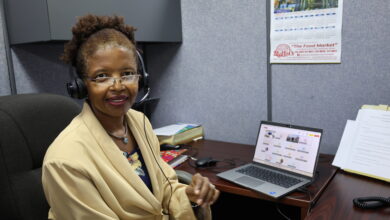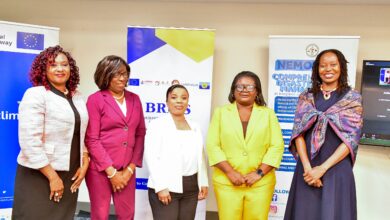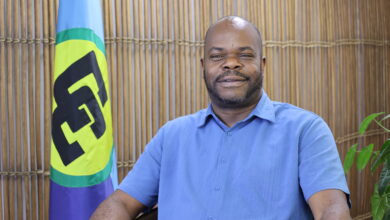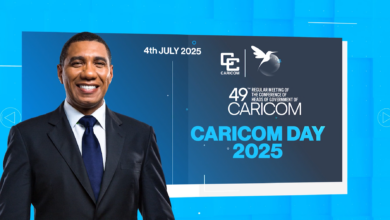Madam/Mr. Speaker, allow me on behalf of the Government and People of Belize to warmly welcome to Belize this Assembly of distinguished Caribbean Community Parliamentarians, the Secretary General of the Caribbean Community (CARICOM), observers, and other distinguished guests.
Madam/Mr. Speaker, it was some six years ago in 1994 that the Inter-Governmental Agreement establishing the Assembly of Caribbean Community Parliamentarians (ACCP) entered into force. Two years later the First Meeting of the ACCP was held in Barbados in May 1996.
The objectives of the ACCP include, among other things, involving people of the Community in the process of consolidating and strengthening the Community and in the process of regional integration. But perhaps one of the most important of the stated objectives of the ACCP is: “to provide a forum for the people of the Community to make their views known through their representatives.”
I believe that one of the most important challenges we as Caricom Parliamentarians face in this Assembly as well as in our own individual parliaments, is how best we can touch the lives of ordinary people across the Region in a meaningful way, people whose concerns are rising crime rates, access to health and education and a decent standard of living.
How can Caricom and the ACCP respond to these concerns and have a more direct influence or impact? Surely, a part of the answer lies in seeking constantly to reform our democratic institutions and make them more open and accessible to our people for their participation and input.
Madam/Mr. Speaker, we in the Caribbean have enjoyed close to forty years of democratic stability since the first of our territories gained independence in the region. Through our deliberate choice we have enshrined and entrenched in our respective constitutions a political system based on parliamentary democracy.
Our territories, exercising this system of parliamentary democracy have, on the whole, enjoyed an exemplary history and tradition of conducting free and fair elections every five years, changing governments peacefully without civil strife and respecting and abiding the sovereign will of the people expressed by the power of the ballot.
After several decades of practicing this system, we would be doing ourselves a disservice were we not to admit that genuine empowerment of our people must now find expression beyond five minutes in the voting booth every five years.
We as politicians, Madam/Mr. Speaker, would be deluding ourselves were we not to accept that there is a groundswell of support for more public participation in directing and influencing the affairs of government, The voices of the ordinary people, the marginalized youth, women, indigenous people, the civil society organizations, our workers, farmers and professionals are demanding to be heard and calling for a greater voice in how their lives are to be directed.
We must answer that call. And we must do so quickly. It is a call to which we cannot defer an answer without defaulting on our obligations, not only to the present, but also to future generations.
How do we, therefore, reform our democratic structures, one of the most important of which is our national parliament, to be more meaningful and responsive to the call of our people for greater participation, accountability and transparency?
Madam/Mr. Speaker, there is no fixed formula for achieving this. Indeed, it is a process that should be ongoing and constantly evolving in tandem with our changing realities. What we are talking about here is nothing short of a cultural transformation.
But I don’t think we can go wrong if we seek to establish mechanisms that will effectively give our people greater participation in the institutions of government. If people are given an input, over and beyond electing their representatives, and their input is respected, then they are made to feel genuinely involved in the decision-making process of finding solutions to the issues and concerns that affect their lives.
Here in Belize, Madam/Mr. Speaker, we have tried a number of different ways of answering the summons of our people for a greater voice in the affairs of their government. We have done this by attempting to strengthen and reform aspects of the system of parliamentary democracy.
Two years ago, for example, we amended the Standing Orders of the House of Representatives to give greater powers to the Oversight Committees covering the various areas of governance. This amendment was designed to lessen the power of ministries and to give oversight powers to these oversight committees chaired by “backbenchers”.
The Oversight Committees have the power “to oversee expenditure, administration and policy of government departments and their associated public bodies and may summon ministers” send for papers, records and utilize the services of specialist advisers in the execution of their duties. Very importantly, the Chairperson of the Public Accounts Oversight Committee must be a member of the Opposition Party.
We also instituted the practice of providing elected parliamentarians, regardless of political party, with a budget to be able to operate a constituency office and so be better able to serve the needs of their constituents.
At the suggestion of the civil society organizations, we have instituted the practice of quarterly meetings between the Prime Minister and the Civil Society Steering Committee and provided a Ministry with responsibility for Civil Society.
We have found it useful to include representatives of unions, the private sector organizations and civil society on as many governmental and statutory boards as possible. In preparing legislation we try to be ever mindful of the need to reflect, so far as is possible, this new partnership in the organization and structure of new statutory entities being created.
We have also passed a Village Councils Act, which gives greater autonomy, authority and responsibility to elected village leaders.
One year ago, the first referendum, under the newly enacted Referendum Act, was held in the capital Belmopan to determine whether Belmopan should be designated a City with its own elected City Council, and their wishes were carried out.
Perhaps the time has come to broaden the participation in some aspect of this Assembly of CARICOM Parliamentarians to include representatives of civil society.
Madam/Mr. Speaker, the agenda for this Third Meeting of the ACCP touches on many important topics, including CARICOM Single Market and the Economy, Measures for Addressing the Major Social Challenges Among our Youth, CARICOM-Central American Relations, OECD Harmful Tax Competition Issues, and Information and Communication Technology Development in the Region. These are all weighty issues that we must squarely and soberly address, for each of them, whether taken separately or jointly, has far-reaching implications for the people of the region.
We have entered the 21st century against the background of historic changes, which have seen the fall of the Berlin Wall, the formation of a Single European Market and the rise of North America Free Trade Area between Canada, the United States and Mexico. The driving force of globalization and market economies has little or no respect for a nation’s flag, its anthem and seat in the United Nations. Social responsibility for combating poverty within countries as well as globally is rapidly eroding.
Many of our poor are too unskilled and lacking in basic assets as land and tools, or just too malnourished or stressed out in the struggle for survival to participate meaningfully in the work of economic development. They are the victims of the debilitating pressures which society puts on the poor.
As individual small nation states we too suffer the same pressures brought on by the hurricane force winds of nature and of unbridled economic and trade globalization.
Now more than ever in the words the West Indian Commission Report, we, “the diverse people of scattered islands and mainland countries plucked from far continents by cruel history” separated by the Caribbean Sea, must realize that this same Sea “through long centuries of struggle against uneven odds have been steadily making us one.” We need that unity, to speak and negotiate as one collective voice in order to secure a space – a window of opportunity for the people of our region.
Madam/Mr. Speaker, to you, I offer my congratulations on your election as Speaker of this Third Meeting of CARICOM Parliamentarians and to the Assembly, I offer my hopes and best wishes for a productive, honest and open discussion of the items on the agenda today.
Thank you.





